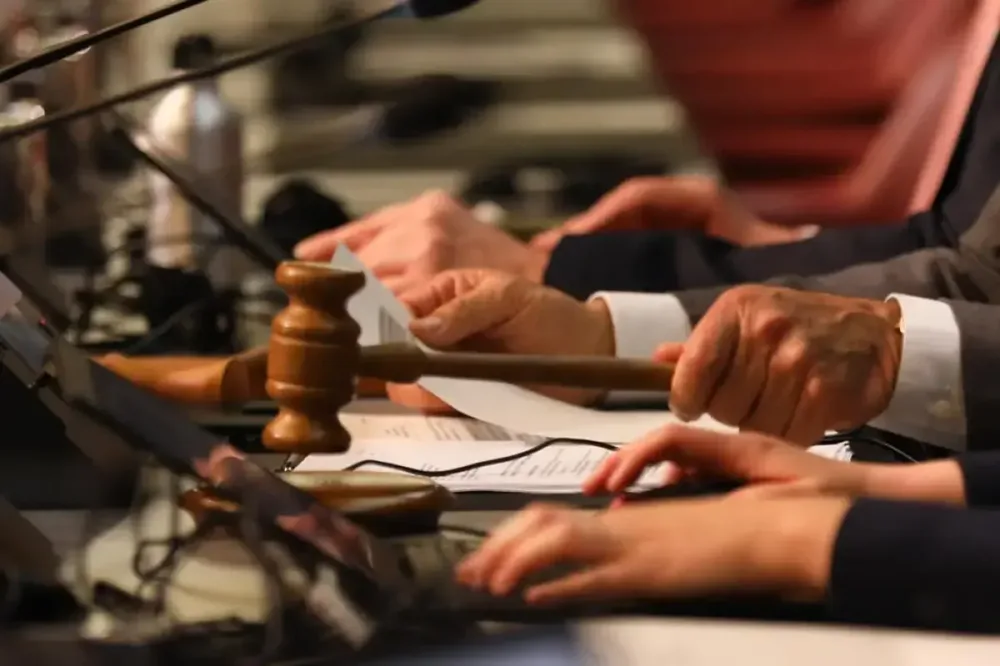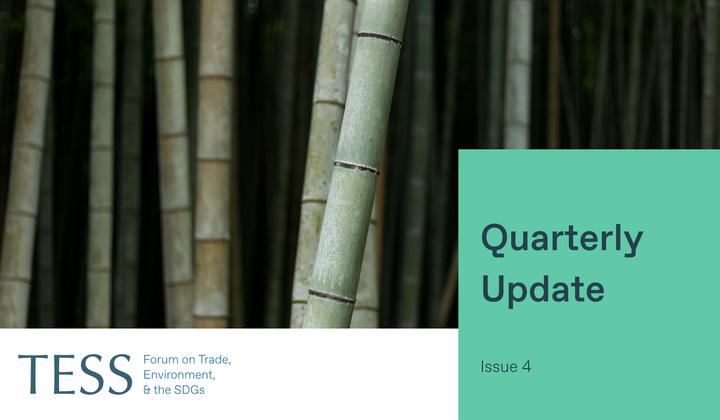Welcome to the fifth edition of the TESS Quarterly Update. The past quarter has seen increasing engagement by governments and stakeholders on issues of trade and sustainability at the multilateral level, with significant work ahead in the coming months.
At the World Trade Organization (WTO), governments are gearing up for the Thirteenth Ministerial Conference (MC13), scheduled for February 2024. On 13 March, participants at the WTO Dialogue on Plastics Pollution plenary meeting began discussions on the vision for MC13 outcomes, including how a ministerial statement on trade-related cooperation could contribute to ongoing process at the United Nations to conclude a new international legally binding instrument on plastic pollution. To contribute to discussion on pathways to MC13, TESS shared views on possible approaches to producing “concrete, pragmatic, and effective outcomes,” drawing on its presentation on this topic at the February pre-plenary of the DPP.
On 16–17 March, participants in the Trade and Environmental Sustainability Structured Discussions (TESSD) at the WTO advanced work in working groups covering trade-related climate measures, subsidies, environmental goods and services, and the circular economy. TESSD co-sponsors are also considering what kinds of outcomes they can contribute to MC13 on trade and sustainability. At meetings on 14–15 March, the Committee on Trade and Environment (CTE) welcomed its new Committee Chair, Ambassador José Valencia of Ecuador, who has begun engaging in consultations on ways to reinvigorate the committee.
Also in March, the WTO announced that the Public Forum 2023, to be held from 12–15 September, will focus on how trade can contribute to a greener, more sustainable future. Meanwhile, stay tuned for more from the WTO Secretariat on the agenda for the fourth edition of WTO Trade and Environment Week, this year to be held alongside the meetings of the CTE during the week of June 12.
On 11 April and 2 May, the United States and Canada, both large fishing nations, became the fourth and fifth WTO members to deposit their instruments of acceptance for the WTO Agreement on Fisheries Subsidies. They have since been joined by a seventh WTO member, Iceland. For the agreement to become operational, two-thirds of members have to deposit their instruments of acceptance with the WTO. Meanwhile, consistent with their agreement in June 2022, members are continuing negotiations on outstanding issues with a view to making recommendations by MC13. Unless WTO members decide otherwise, the current agreement on fisheries subsidies will lapse if more comprehensive disciplines are not adopted within four years of entry into force.

Beyond the WTO, a number of important multilateral processes relevant to trade and sustainability are on our radar.
The High-level Political Forum on Sustainable Development (HLPF)—the international process for follow up and review of the 2030 Agenda—will be held from 10–19 July. The July HLPF will support the mid-term review of the implementation of the SDGs and preparations for the SDG Summit 2023 to be convened under the auspices of the General Assembly in September. On the agenda are key issues and priorities relevant to the multilateral trade agenda, including affordable and clean energy (SDG 7), industry, innovation, and infrastructure (SDG 9), and global partnerships (SDG 17). The summit will mark the mid-point of the implementation of the 2030 Agenda.
Sounding the alarm, an advance report of the Secretary-General emphasizes that many of the SDGs are moderately to severely off track.
Sounding the alarm, an advance report of the Secretary-General emphasizes that many of the SDGs are moderately to severely off track, with only 12% of the 140 assessed targets on course to meet the 2030 deadline. Earlier, in February, the UN released the Secretary-General’s SDG Stimulus to Deliver Agenda 2030 calling for a significant increase in financing for sustainable development to at least $500 billion per year.
On 8–9 May, the UN Trade Forum took place in Geneva, focusing on Toward the SDG Summit 2023: High-impact trade initiatives for accelerating the SDGs. The opening plenary session highlighted the role of South-South trade partnerships in accelerating progress on the SDGs, and the second session saw the launch of the Trade and Environment Review 2023: Building a sustainable ocean economy which provides analysis of trade-related sustainability challenges, opportunities and priorities linked to protecting oceans, sustainable ocean economies, and sustainable use of marine resources.

Image from IISD Earth Negotiations Bulletin
Following progress made on plastic waste management guidelines in February, parties to the Basel Convention adopted technical guidelines on the environmentally sound management of plastic waste, persistent organic pollutants waste, and e-waste during the 2023 Conferences of the Basel, Rotterdam, and Stockholm Conventions (BRS triple COP) held from 1–12 May. In addition, the Stockholm Convention adopted decisions to list for elimination three new chemicals (Dechlorane Plus, UV-328, and methoxychlor) that pose significant health and environmental risks.
From 29 May–2 June, the second session of the Intergovernmental Negotiating Committee to develop an international legally binding instrument on plastic pollution, including in the marine environment (INC-2) will take place in Paris, France. As governments work to conclude the treaty by December 2024, TESS is supporting discussions and analysis on where and how enhanced international cooperation on trade and trade policies can facilitate the treaty negotiations and exploring synergies with the WTO Dialogue on Plastics Pollution. .
In March, the IPCC released the Synthesis Report of its Sixth Assessment Report with a clear warning: act now or it's too late.
In March, the Intergovernmental Panel on Climate Change released the Synthesis Report of its Sixth Assessment Report with a clear warning: act now or it’s too late. Ahead of the 2023 UN Climate Change Conference (COP28), which will convene from 30 November to 12 December 2023 in Dubai, the UNFCCC subsidiary bodies will meet at the Bonn Climate Change Conference on 5–15 June. Among other items on the agenda, the parties will convene the third technical dialogue of the first global stocktake of the Paris Agreement—a process enabling countries and other stakeholders to assess the world’s collective progress towards achieving the agreement’s goals. The global stocktake is expected to conclude at COP28 where there will be an opportunity to review its outcomes.
What We've Focused On

Climate Crisis
Over the past months, TESS has convened an international expert group of leading international climate and trade lawyers from across the world to provide guidance on principles from international law relevant to the design and implementation of trade-related climate measures and policies. We are delighted to announce that the report of the expert group will be released in June and presented during WTO Trade and Environment Week.
In February, we concluded the first phase of our initiative on developing country perspectives on trade, climate, and sustainable development by releasing a policy paper offering a Latin American perspective to accompany papers focused on the African, Southeast Asian, and the Caribbean regions.
In a commentary on the Coalition of Trade Ministers on Climate published in April by the International Institute for Sustainable Development (IISD), TESS Director Carolyn Deere Birkbeck emphasizes the importance of stronger political-level leadership and inclusive international cooperation, stressing that failure to cooperate on trade will undermine progress on achieving climate goals.
On 2–5 May, TESS Head of Policy Analysis Christophe Bellmann participated in a workshop on Trade and climate action: Shifting the paradigm for a just transition to sustainable development in Bridgetown, Barbados. The meeting is part of a series of international workshops hosted by the Remaking the global trading system for a sustainable future project—a joint initiative of the Yale Center for Environmental Law and Policy, the Shridath Ramphal Centre of the University of the West Indies (SRC), and the Fletcher School of Law and Diplomacy at Tufts University. TESS is a member of the project Steering Committee and was pleased to be part of the Organizing Committee for the Barbados workshop with the SRC and the University of Oxford’s Blavatnik School of Government. A concrete outcome of the workshop was to provide inputs into the Bridgetown Initiative 2.0—which focuses on reform of the global financial system to drive financial resources and investment towards climate action and the SDGs—with a new action area six designed to create an international trade system that supports global green and just transformations.

Plastic Pollution
Our work on plastic pollution continued to gather steam over the past quarter. On 29 March, we co-hosted with UNEP a deep dive on trade, plastics, and plastic pollution to brainstorm on how trade and trade policy can help end plastic pollution. The meeting focused specifically on the relevance of trade-related policies for reducing trade in harmful, problematic, and unnecessary plastics and shifting to sustainable value chains.
A few days earlier, on 24 March, in collaboration with the Minderoo Foundation we hosted a roundtable bringing together a diverse group of experts from intergovernmental organizations, governments, and stakeholder groups working on environment, health, and trade dimensions of plastic pollution to discuss the findings of the Minderoo-Monaco Commission on Plastics and Human Health and their implications for the global plastics treaty negotiations.
At the WTO Dialogue on Plastics Pollution, we contributed to the 16 February pre-plenary by presenting the findings of our policy brief on the evolution and state of play of the Dialogue, including an overview of key options for trade-related cooperation and potential next steps for MC13. As noted, in the subsequent plenary on 13 March, we responded to the request for views on the vision for a possible pathway to MC13, which can be found in this statement.
Finally, at a 27 April workshop on Reduction and circularity to tackle plastic pollution organized by the WTO in collaboration with UNEP, TESS circulated an advance draft of our upcoming TESS briefing note on trends in trade flows across the life cycle of plastics, which highlighted again the need to improve the transparency of trade flows across the life cycle of plastics as well as their material composition.

Biodiversity and Sustainability in Agriculture, Food Systems, and Use of Natural Resources
On 14 March, we collaborated with UNEP, the WTO, and the CBD Secretariat to convene a roundtable on nature-positive trade for sustainable development. The key message was that trade cooperation has a key role to play in supporting implementation of all 23 biodiversity targets covered under the Kunming-Montreal Global Biodiversity Framework adopted in December 2022. In the lead up to the roundtable, TESS and UNEP co-published with UKRI GCRF and TRADEHub a policy brief by Marianne Kettunen, which reviewed opportunities in the multilateral trade policy arena to strengthen cooperation on trade and trade-related policies and measures in support of global biodiversity and sustainable development objectives.
As part of our sustainable agriculture and trade roundtable series, on 28 April, we co-hosted with UNEP a roundtable on trade and deforestation that explored key trends and policy developments as well as options for promoting inclusive trade-related cooperation on deforestation in ways that address the challenges faced by developing countries in relation to deforestation, trade, and sustainability, and to fostering a transition to more sustainable agriculture practices.
In a related commentary published on 17 April, Christophe Bellmann of TESS explores new windows of opportunity to advance cooperation in the area of sustainable agriculture and trade at the WTO. The article draws on a TESS policy brief published in late 2022 in which Christophe argues that a core challenge for international cooperation is how to ensure that trade and trade policies support sustainable production and access to nutritious food in ways that protect the environment, improve livelihoods, and promote sustainable development.

Circular Economy
To contribute to discussions on the relevance of trade and trade-related policies to the circular economy transition in different sectors, on 23 March, we organized with UNEP a roundtable on trade, the circular economy, and sustainable development in the textiles and clothing sector.
The roundtable highlighted that the current linear model of the textiles and clothing sector puts significant pressure on natural resources and ecosystems across the life cycle of products. Participants noted that the transition to a more circular textiles sector requires a shift towards safe, recycled, or renewable inputs, with a significant reduction in the use of virgin non-renewable materials. The discussions also underlined that a large number of developing countries, including the least developed, represent a significant share of total exports in textiles and clothing. The roundtable highlighted the range of trade-related challenges and opportunities for developing countries relevant to an inclusive and fair transition to circularity in the textiles and clothing sector that serves
What We're Reading

In this new section of our newsletter, we provide links to a sample of publications released in recent months by a diversity of stakeholders that shed light on some of the key trends, issues, and policy debates relevant to trade and sustainability.
Trade and Environment Review 2023: Building a Sustainable Ocean Economy – UNCTAD, May 2023
Chemicals in Plastics – A Technical Report – UNEP and BRS, May 2023
Standards and the Sustainable Development Goals: Leveraging Sustainability Standards for Reporting on SDG Progress – IISD, May 2023
Trade and Development Report Update: Global Trends and Prospects – UNCTAD, April 2023
Trade Governance for the Energy Future: Five Key Pillars for International Cooperation – CEP, April 2023
ICC 2023 Trade Report: A Fragmenting World – ICC, April 2023
AR6 Synthesis Report: Climate Change 2023 – IPCC, March 2023
World Energy Transitions Outlook: 1.5oC Pathway – IRENA, March 2023
United Nations Secretary-General’s SDG Stimulus to Deliver Agenda 2030 – UN, February 2023
A New Fair Deal for Climate, Trade and Development – E3G, February 2023
Decent Work in Nature-based Solutions – ILO, UNEP, and IUCN, December 2022



